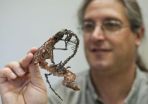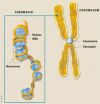(Press-News.org) Many cancer survivors experience changes in sexual function that leave them feeling guilty and a longing for intimacy, Australian researchers told at the 35th Congress of the European Society for Medical Oncology (ESMO) in Milan, Italy. The researchers say that these sexuality and fertility concerns are often not adequately addressed by doctors.
Professor Bogda Koczwara from Flinders Medical Centre in Adelaide said that fertility concerns among cancer survivors was a growing problem, due to a combination of improved cancer treatment outcomes in young cancer survivors and the trend for people to delay having children.
Millions of people worldwide are living after treatment for cancer, many of them still of reproductive age, Prof Koczwara said. To evaluate the range of fertility and sexuality concerns among these patients, she and her colleagues interviewed 25 cancer survivors --19 women and 6 men.
"Respondents perceived fertility as an important concern that was often inadequately addressed by healthcare providers," Prof Koczwara said.
"The most intriguing finding was that fertility concerns were also identified by women who have already completed their family, and fertility was an important issue even for those women who had no plans for further children."
The researchers found that fertility was important for these patients' sense of identity and body image. "That is important, as doctors may not raise these issues with patients who claim not to have plans for further children. As our study points out, maybe we should."
Sexuality and fertility can be affected by cancer and its treatment in a variety of ways. For some cancers, treatment may involve removal of reproductive organs. For others, the chemotherapy or radiotherapy may affect reproductive organs function either temporarily or permanently. For most patients, cancer treatment, delays reproduction and by making the patient unwell may impact on sexual desire.
In this study, sexual concerns seemed to be related to changes in body image and sexual identity, and the often discrepant sexual needs of patient and their partner.
For single people, changes in sexual function resulted in anxiety about entering into future relationships.
"The lack of desire attributed to cancer treatment was associated with feelings of guilt about not supporting the partner among the participants in our study," Prof Koczwara said. With time, many respondents accepted fertility loss but struggled with ongoing impact of changes in sexual function and its impact on their relationships.
Prof Koczwara said there are some good resources available for patients to help them with concerns about fertility and sexuality, but patients in the study indicated interest in more information and resources."
"There appears to be a need for raising awareness of these concerns among cancer professionals and providing them with information and training regarding these concerns," she said.
Prof Ian Olver, CEO of Cancer Council Australia, commented that the presentation by Prof Koczwara highlights a major issue that impacts on the quality of life of people who survive cancer.
"Up to 65% patients diagnosed with cancer are still alive in 5 years, and survival is increasing with better treatments. Until recently the emphasis was on treating the cancer but it is being increasingly recognized that a variety of psychosocial problems and late effects of treatment persist and need to be addressed in this population," Prof Olver said.
"Perhaps the most surprising aspect of Prof Koczwara's study is that issues of fertility are important even to those who have completed their families, which highlights the importance of fertility to a person's identity. The call for greater awareness amongst cancer professionals of sexual and fertility issues should be translated as the need to provide the opportunity for patients to discuss these issues and then have the appropriate support to help in their resolution."
INFORMATION: END
In life, we're told, we must take the good with the bad, and how we view these life events determines our well-being and ability to adjust. But according to Prof. Dov Shmotkin of Tel Aviv University's Department of Psychology, you need more than the right attitude to successfully negotiate the vicissitudes of life.
As recently reported in Aging and Mental Health, Prof. Shmotkin's research reveals that people's well-being and their adaptation can be ascertained by their "time trajectory" ― their concept of how they have evolved through their remembered past, currently ...
New drugs that target specific molecular mechanisms of cancer have improved the treatment of cancer patients in recent years, but those benefits may come with a cost to the patient's sex life, researchers have found.
At the 35th Congress of the European Society for Medical Oncology (ESMO) in Milan, Italy, French researchers reported on one of the few studies to investigate the impact of cancer therapy on the sexual functioning of patients.
Dr Yohann Loriot and Dr Thomas Bessede from Institut Gustave Roussy in Villejuif, France and colleagues found that patients taking ...
Lung cancer patients who have already been treated with the EGFR inhibitors erlotinib or gefitinib seem to gain further benefits in terms of progression-free survival and tumor shrinkage when treated with the new drug afatinib, the results of a Phase IIb/III trial show.
At the 35th Congress of the European Society for Medical Oncology (ESMO) in Milan, Italy, Dr Vincent Miller from Memorial Sloan-Kettering Cancer Center in New York, USA, reported findings from the LUX-Lung 1 trial of afatinib in 585 patients with lung adenocarcinoma whose cancer had progressed after chemotherapy ...
A new-generation lung cancer drug has shown an impressive ability to prevent disease progression when administered as a first-line treatment in patients with advanced disease, investigators reported at the 35th Congress of the European Society for Medical Oncology (ESMO).
Preliminary results from an ongoing Phase-II trial of the drug PF299804 (PF-299) showed that close to 85% of patients whose cancers harbor mutated forms of the EGFR gene have remained progression-free for at least nine months, reported Dr Tony Mok from the Chinese University of Hong Kong.
While some ...
An ongoing Phase-II trial investigating a new, targeted therapy for metastatic urothelial cancer has generated promising early results, Italian researchers reported at the 35th Congress of the European Society for Medical Oncology (ESMO) in Milan, Italy.
Urothelial cancers affect the tissue lining the inner surfaces of the bladder and other parts of the urinary system. In cases of metastatic disease, median survival is approximately 12-15 months and there is a 10-15% chance of prolonging it by the use of standard chemotherapy regimens, particularly in otherwise healthy ...
The results of a large Phase-III clinical trial have shown that the drug everolimus delays tumor progression in patients with a hard-to-treat group of rare cancers that affect particular hormone-producing cells.
At the 35th Congress of the European Society for Medical Oncology (ESMO), Dr Marianne Pavel from Charité University in Berlin, Germany reported that everolimus improved progression-free survival by 5.1 months in patients with advanced neuroendocrine tumors.
Neuroendocrine tumors are slow-growing malignancies that originate from cells of the body's neuroendocrine ...
A new class of compounds identified by researchers at Emory University School of Medicine could be developed into drugs for the treatment of schizophrenia. The compounds enhance signaling by molecules in the brain called NMDA receptors, which scientists believe are functioning at low levels in people with schizophrenia.
Led by Stephen Traynelis, PhD, professor of pharmacology, a team of Emory researchers sifted through thousands of chemicals and found one, called CIQ, which could selectively enhance the function of certain NMDA receptors without affecting others.
The ...
Iowa City, IA—October 11, 2010— A new study published in Applied Cognitive Psychology finds that college-aged men are very likely to remember a woman's initial sexual interest (attraction or rejection), especially when the woman in question is thought to be attractive, is dressed more provocatively, and expresses positive sexual interest.
In the study the men were shown full-body photographs of college-aged women who expressed cues of sexual interest or rejection. The participating males represented mixed sexual histories, and a capacity for varying degrees of sexually ...
GAINESVILLE, Fla. --- University of Florida researchers presenting new fossil evidence of an exceptionally well-preserved 55-million-year-old North American mammal have found it shares a common ancestor with rodents and primates, including humans.The study published today in the online edition of the Zoological Journal of the Linnean Society, describes the cranial anatomy of the extinct mammal, Labidolemur kayi.
High resolution CT scans of the specimens allowed researchers to study minute details in the skull, including bone structures smaller than one-tenth of a millimeter. ...
The genetic inherited material DNA was long viewed as the sole bearer of hereditary information. The function of its packaging proteins, the histones, was believed to be exclusively structural. Additional genetic information can be stored, however, and passed on to subsequent generations through chemical changes in the DNA or histones. Scientists from the Max Planck Institute for Biophysical Chemistry in Göttingen have succeeded in creating an experimental system for testing the function of such chemical histone modifications and their influence on the organism. Chemical ...

